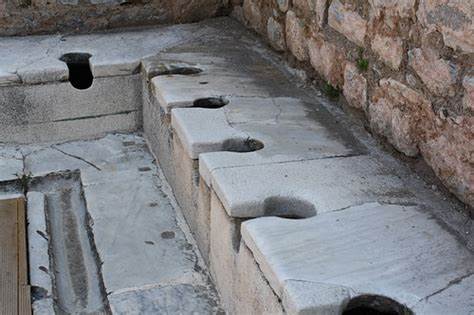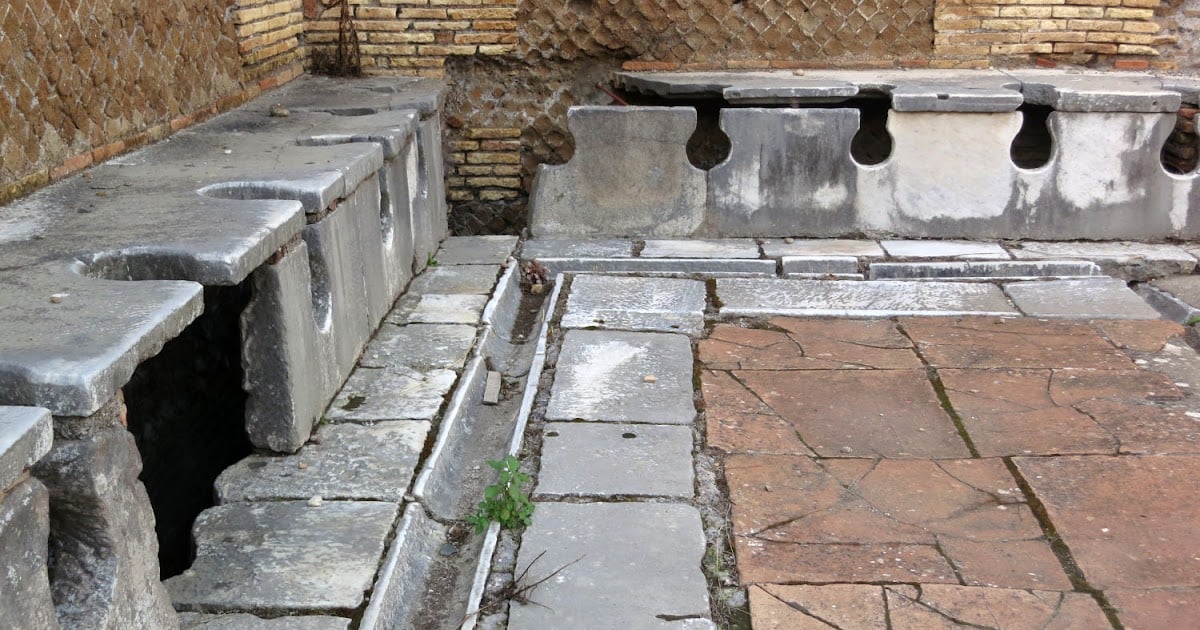- cross-posted to:
- roughromanmemes@lemmy.world
- cross-posted to:
- roughromanmemes@lemmy.world
And they used to wash by scraping themselves and covering their body in olive oil. I remember reading about Romans laughing at “barbarian” foreigners from Gaul who would create bars out of animal fat, ashes and flowers to wash themselves with, like a bunch of heathens.
Bidet gang, represent
There are dozens of us! DOZENS!!!
All 36 of you lol
Don’t get me started on how coddled the modern anus is.
Sorry to be that guy, but it seems the romans didn’t wipe with an sponge on a stick.
From a mural in the baths form the Secen Sages in Ostia Antica, it seems it was use to clean the toilets after use.
-
The idea that the tersorium was a toilet brush is very much a minority view.
-
That line (“Use the tersorium”) points much more towards the use of the tersorium to wipe than to clean toilets.
Makes much more sense that the use it like we do nowadays with toilet brushes. Especially if there was a mural telling people to use it. Usually you don’t have to reminder or care to tell people to wipe their own ass.
-
Have you met people? We have to remind them to wash their hands even in the modern day, and too many men don’t wipe their own fucking ass. There’s Roman poetry excoriating men for not grooming themselves in the most basic ways.
-
A public bathroom reminding people to perform hygiene maintenance on the toilets seems much less likely. Especially considering the small size of Roman latrine holes and the depth of most latrines.
-What should people care if one guy has a scratchy ass? Remember, in Roman time there was no concept of bacteria. -If there were so depth and small, maybe a stick will come in handy, don’t you think?
-What should people care if one guy has a scratchy ass? Remember, in Roman time there was no concept of bacteria.
Because it’s in the interest of other people that people aren’t dragging their shit filled ass around in public, stinking up the place. The Roman concepts of cleanliness and miasma were still very much in play.
-If there were so depth and small, maybe a stick will come in handy, don’t you think?
Expecting the users of a public bathroom to go elbow-deep in a toilet with a sponge on a stick to blindly poke around in the hopes that they’ll do a good job cleaning sounds much less likely to me than expecting them to wipe.
-You are overestimating the amount of shit produced in one siting XD. Also, I you get yourself dirty is YOUR shame, so more interest in keeping yourself clean. -You don’t have to go that deep. Also, using a stick to clean your ass is very uncomfortable, one should expect that the romans would have found a better way in all its story.
P.S. I love being able to discus how people in ancient times wiped them selves.
-You are overestimating the amount of shit produced in one siting XD.
People who don’t wipe very often smell - especially if, as in Roman society, you would not have necessarily been taking every shit at a convenient latrine.
Also, I you get yourself dirty is YOUR shame, so more interest in keeping yourself clean.
Romans were a very communal society, and as mentioned, public cleanliness and the idea of ‘foul air’ causing illness were important ideas to the Romans.
You don’t have to go that deep.


The hole isn’t large and the latrine isn’t exactly shallow. How deep are you going to get in that before you have to put your arm in there?
-
-
What. You don’t know how to use the three seashells? Check this guy out everyone.
Wild that, by votes, this reference is recognized by more people than who have know the joy of that bidet life.
Explanation: The ancient Romans used the xylospongium or tersorium for wiping purposes - a sea sponge on a stick. How lovely! In public restrooms, they would have been shared, which is probably not all that hygienic regardless of the fact that they rinsed the sponge after each use, or let it soak in vinegar or salt water when idle. Still, civilization! What marvels, right?
My sphincter winced the most at saltwater rinse.
Better than iodine, I suppose.It’s funny where observation leads one - the Romans didn’t understand why salt water was good for sanitizing (that most microbes are not halophilic), but recognized by practice that it was good. There’s a bit in De Architectura where Vitruvius discusses how a town dug a channel from the sea to turn the nearby swamps into a brackish marsh, and that disease rates plummeted afterwards. If memory serves he attributes it to ‘poisonous vapors’ being removed by the saline water, while we would recognize it as destroying the ideal environment for mosquitos and other such insects.
Are you trying to tell me it had nothing to do with thoughts and prayers and sacrifice and dancing to gods?
Pshaw, Bruté.
Meanwhile the Greeks make due with pottery shards






